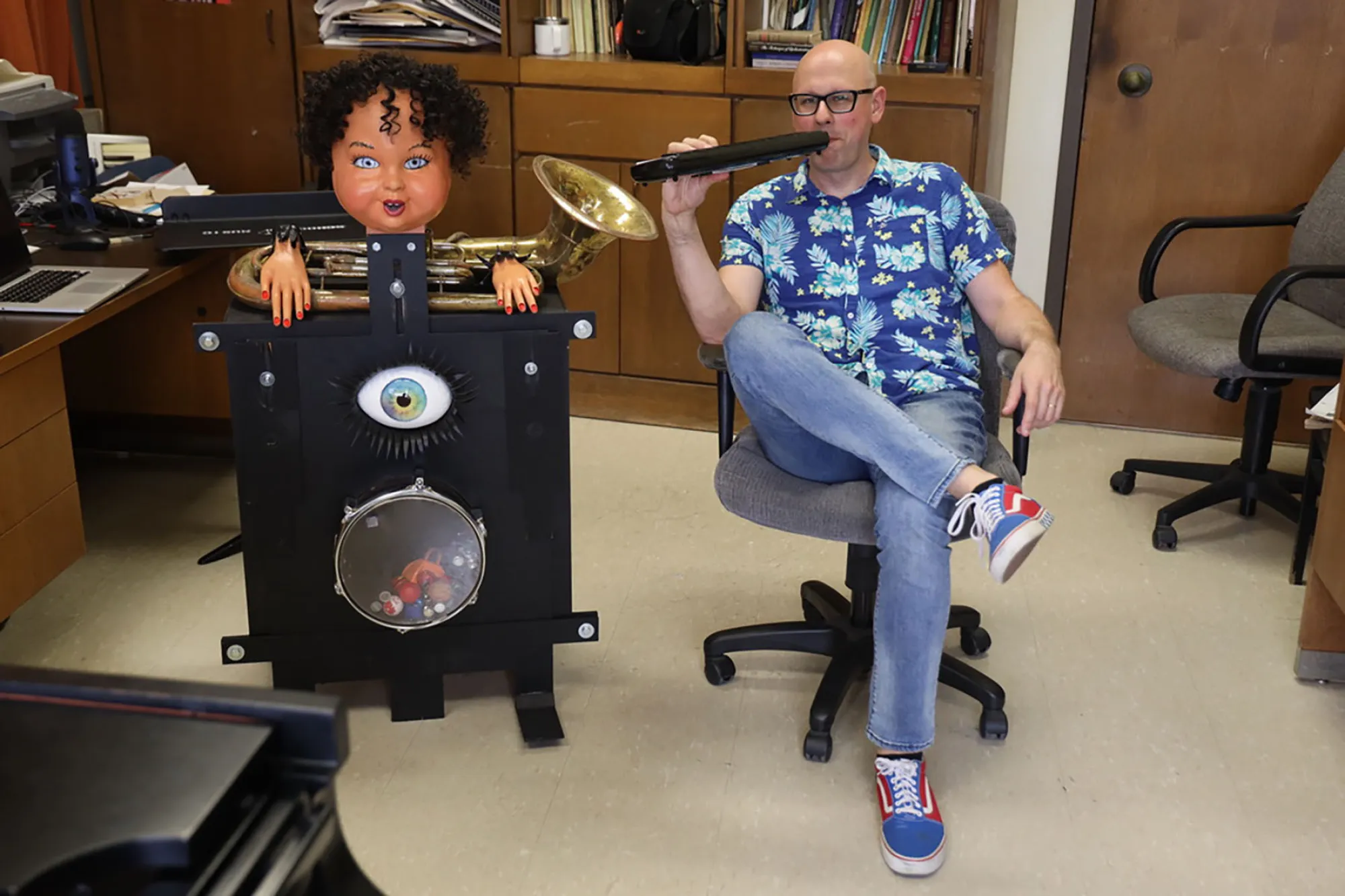July 21, 2025

When a student walks into Yevgeniy Sharlat’s office, they’re usually carrying a carefully crafted piece of music they’ve poured themselves into. They expect feedback. Notes. Corrections. But Sharlat doesn’t reach for a red pen. Instead, he asks a question.
“Why did you write this?” he might say. “What’s going on in your life right now?”
It’s not what students expect. But it’s exactly what makes Sharlat different, and why, for the 2024–2025 academic year, he has been awarded the Butler School of Music’s prestigious Teaching Excellence Award. Sharing the honor with fellow faculty member Ivan Trevino, Sharlat is being recognized for his deep commitment to student learning, creative development, and innovation in teaching.
“Teaching composition is unlike any other music discipline,” Sharlat explained. “In most areas, the teacher is the authority. But with composition, the student brings their own voice, their identity. They’re the authority on their piece. I’m here to help guide them, not to lecture.”
That guidance begins with conversation, not critique. Sharlat’s approach challenges the traditional image of the stern professor behind a desk. He sees teaching composition as an act of collaboration, one that starts by understanding the person behind the music.
For many students, that means talking about more than just notation or form. “A lot of my students struggle with self-doubt or lack of motivation,” he said. “Sometimes the lesson is about their emotional state. Sometimes it’s about why something won’t work on French horn. And sometimes, both of those things happen in the same meeting.”
Over the years, Sharlat has refined his approach. When he first started teaching, he would dive straight into analyzing a score. But he quickly realized something was missing. “Now, I try to step back and listen more,” he said. “Ask more questions. Help students figure out where they want to go.”
Excerpts from Yevgeniy Sharlat's opera Paradiso
He also encourages his students to look beyond the world of classical music. Collaboration is central to his teaching. He urges students to talk to filmmakers, dancers, and artists from other disciplines, not just to broaden their skills, but to find deeper narrative meaning in their work.
“I believe in the power of storytelling,” Sharlat said. “Whether it’s a ballet, a film, or something else entirely, I want students to think about the narrative that drives their music.”
Of course, the path of a young composer is rarely a straight one. Writer’s block is a frequent visitor in Sharlat’s studio. “I haven’t met a single person who isn’t afflicted by it,” he admitted. “Last semester, I had a student who was really stuck. We worked through it together. She triumphed, but the truth is, it’s never completely over. Overcoming writer’s block is like building a muscle. You have to keep working at it.”
And in today’s world, that work can feel even harder. Sharlat is acutely aware of the pressures his students face, both internal and external.
“We live in a culture of distraction,” he said. “There’s a constant barrage of messages saying, ‘What job will this lead to?’ or ‘Why make music when AI can do it for you?’ These thoughts can paralyze you. My job is to help students forget all that, not by ignoring it, but by reconnecting with what matters.”
For Sharlat, what matters most is human connection. “When you’re in a room with other passionate people, that energy is electric,” he said. “It reminds you why you’re doing this.”
He also teaches his students how to listen, not just casually, but deeply. “A lot of people are excited about writing music, but they barely listen to it,” he said. “Or they’re listening with half their attention while scrolling through their phones. Thoughtful, deep listening is essential. That’s how you grow as an artist.”
And in a world obsessed with originality, Sharlat is refreshingly honest: it’s okay to copy.

Yevgeniy Sharlat in his studio next to a sculpture created by Yuliya Lanina
“At the undergraduate level, I encourage imitation,” he said. “Great painters copied the masters. Composers can do the same. There are very few completely original ideas. Most of us are working through variations on what came before.”
His final piece of advice? Let go of perfectionism.
“Perfectionism is the enemy of the good,” Sharlat said. “It paralyzes people. Progress comes not from chasing some flawless ideal, but from showing up, making connections, and doing the work.”
For his students, that lesson, grounded in compassion, curiosity, and real-world creativity,is what makes Sharlat not just a teacher, but a mentor. And now, an award-winning one.

